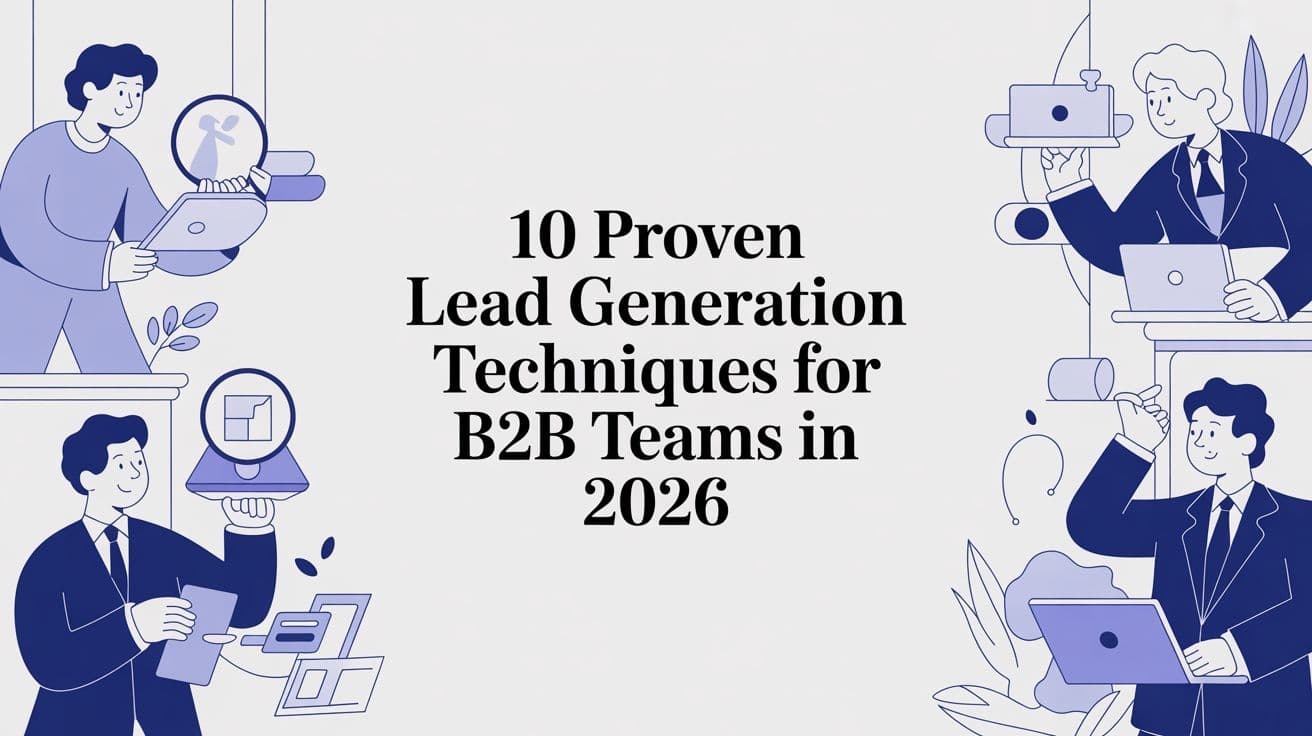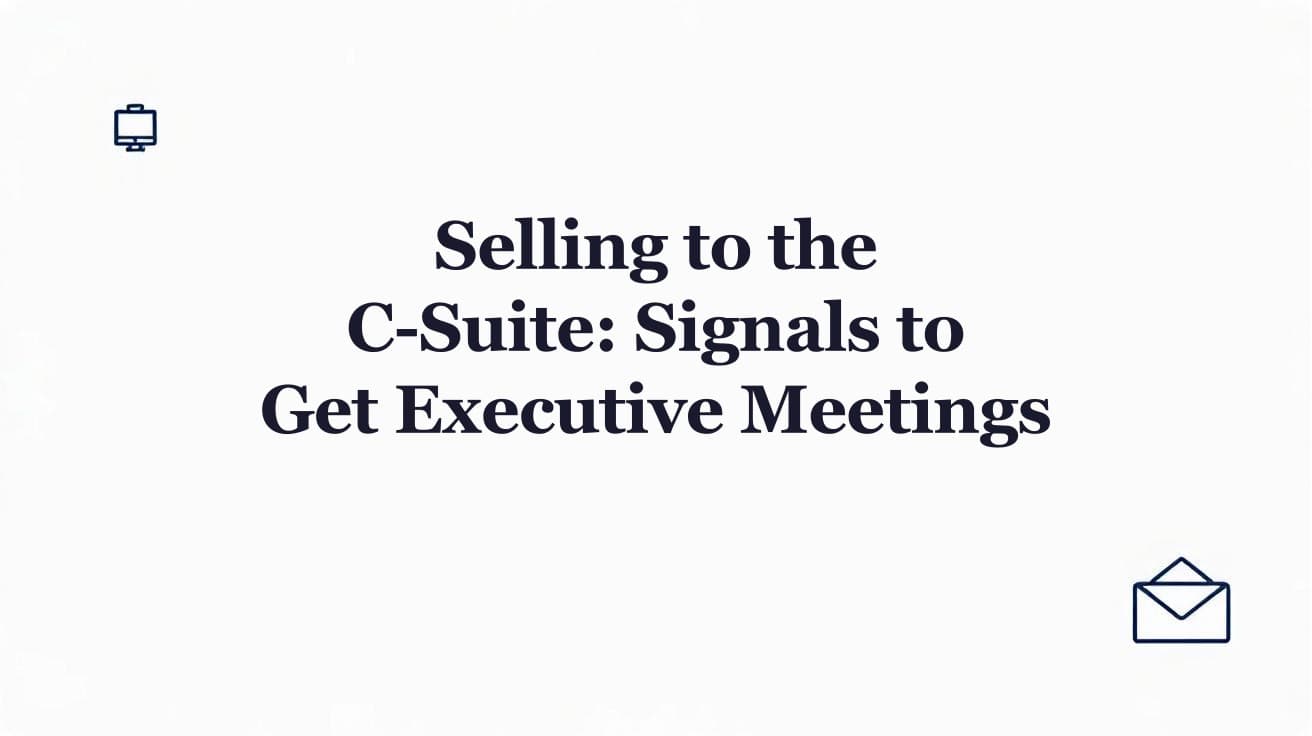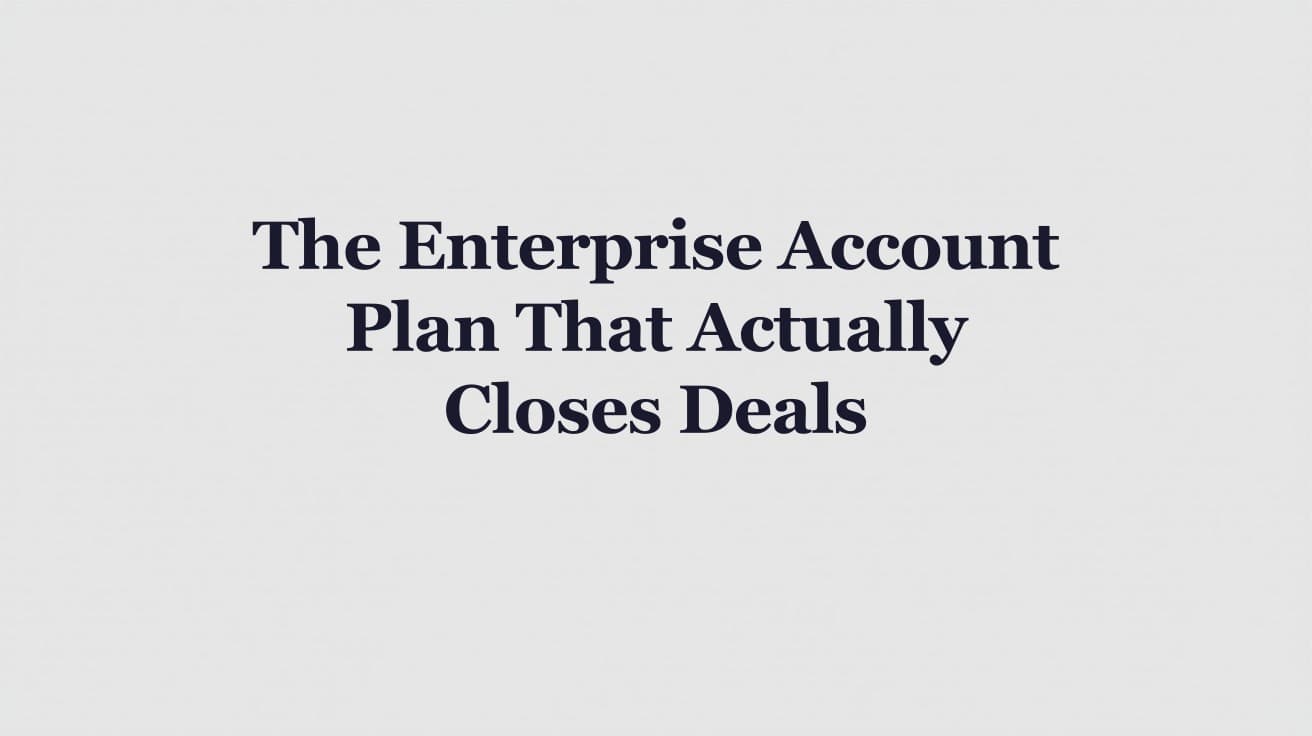Sales enablement consulting gives your team the strategy, content, and training they need to sell more effectively. It’s a strategic partnership designed to build a repeatable system for revenue growth, turning scattered sales efforts into a high-performing machine.
Understanding Sales Enablement Consulting

Think of your sales team as a high-performance race car and your reps as the drivers. A sales enablement consultant is the expert pit crew that fine-tunes everything around the driver to make sure they win the race.
This isn't about someone else taking the wheel. It's a focused collaboration to optimize your sales process, provide relevant content and messaging, and deliver expert coaching on how to navigate your market.
The Core Mission of an Enablement Partner
An external consultant brings a fresh, expert perspective to diagnose the hidden problems holding your team back. They go beyond basic training to build a complete system that equips sellers to engage buyers more intelligently and close deals faster.
Here’s a quick breakdown of what these consultants typically focus on.
Core Components of Sales Enablement Consulting
| Pillar | Objective |
|---|---|
| Strategy | Develop a clear, data-driven plan for how the sales team will hit its revenue goals. |
| Content | Create and organize the playbooks, case studies, and messaging reps need at every stage. |
| Technology | Optimize the sales stack to ensure tools actually support the sales process and get used. |
| Training | Implement ongoing coaching that builds critical skills and reinforces best practices. |
This structured approach gets real results. Organizations with a dedicated sales enablement strategy see a 49% higher win rate on forecasted deals. Consultants bring a proven methodology, helping you build things like scalable outbound campaigns without the high cost of figuring it out internally.
Beyond a One-Time Fix
Great sales enablement consulting isn't a temporary project; it's about building a durable framework for success. The real goal is to embed repeatable processes and a culture of continuous improvement directly into your organization.
A consultant’s true value is creating a self-sustaining system of excellence. They build the machine, teach your team how to run it, and ensure it produces predictable results long after the engagement ends.
This system is a game-changer for B2B companies hitting a growth plateau or struggling with the chaos of scaling too fast. By installing a consistent methodology, you empower everyone—from seasoned vets to new hires—to perform at their best.
For a deeper dive into sales enablement strategies, resources like Explore Buddypro.ai's Blog are a great place to continue learning.
See Salesmotion on a real account
Book a 15-minute demo and see how your team saves hours on account research.
Why Your Sales Team Needs an Enablement Partner
Your sales team is talented, so why bring in an outsider? It’s a fair question. The reality is that even the best reps get bogged down by internal friction. Common issues—like stalled deals or inconsistent messaging—often point to deeper, systemic problems that an external partner is uniquely positioned to solve.
You might recognize the warning signs. Maybe your pipeline is full of promising deals that never close. Or perhaps your messaging is all over the place, with one rep pitching value while another focuses on features. Buyers get confused, and the whole experience feels disjointed.
These aren't isolated incidents. They point to a lack of a unified, repeatable system. Without a clear framework, even your best new hires can struggle to meet quota, leading to high turnover and wasted resources. This is where sales enablement consulting steps in—not as a temporary fix, but as a strategic solution to remove those bottlenecks for good.
Moving from Reactive to Proactive
One of the biggest traps for growing sales teams is getting stuck in a reactive cycle. Reps spend more time hunting for the right case study or figuring out the CRM than they do actually selling. All that scrambling drains energy and pulls them away from the activities that close deals.
A sales enablement consultant acts as a catalyst for change. They analyze your entire sales motion—from tools to training—and build a proactive engine for growth. The goal is to get reps equipped before the call, not scrambling during it.
The impact of this shift is huge. Teams supported by enablement consultants often see up to 50% faster onboarding for new reps because the process is structured and intentional. Instead of learning through trial and error, they’re guided by a proven playbook from day one.
Translating Investment into Tangible Outcomes
Viewing sales enablement consulting as a cost is a mistake; it's a direct investment in your revenue infrastructure. The right partner transforms a disorganized sales function into a predictable machine that generates consistent results. The numbers back this up.
Companies working with sales enablement agencies report an astonishing ROI, sometimes as high as 383%. This return isn't magic—it's driven by concrete improvements in core sales metrics, like higher win rates and shorter sales cycles. You can see a detailed breakdown of sales enablement agency results. Investing here is especially critical when you're trying to scale or break through a performance plateau.
An enablement partner doesn’t just tell your team what to do; they build the systems that make doing the right thing the easiest option. Their goal is to make excellence repeatable and scalable across your entire sales organization.
This systemic approach ensures every seller has the content, coaching, and tools they need, creating a team that operates with confidence and consistency.
Aligning Sales with Broader Business Goals
Sales doesn't operate in a vacuum. Success requires tight alignment with marketing, product, and customer success. A sales enablement consultant often plays a key role here, bridging departmental silos to make sure everyone is working from the same playbook toward the same revenue goals.
This holistic view is a cornerstone of modern revenue operations. By aligning cross-functional teams, a consultant ensures marketing is generating the right leads, the product team understands customer needs, and the sales team can communicate value effectively. This integrated strategy is fundamental to building a sustainable growth engine. To see how this works, it’s helpful to review RevOps best practices that top companies use.
Ultimately, a sales enablement partner provides the strategic oversight and tactical execution needed to elevate your entire revenue organization. They don't just solve today's problems—they build the foundation for tomorrow's growth.
“The talking points are gold. If they're in Salesmotion, I know they're being discussed inside that business. That makes it easy to spark a real conversation, which is 90 percent of the battle.”
Andrew Giordano
VP of Global Commercial Operations, Analytic Partners
The Strategic Deliverables You Can Expect
When you partner with a sales enablement consulting firm, you’re not just buying advice. You’re investing in concrete, strategic assets designed to build a repeatable revenue engine. These deliverables move your sales team from individual efforts to a unified, high-performance system.
The goal is to equip every seller with the exact tools, knowledge, and processes they need to win. Think of it less like a one-time report and more like a permanent upgrade to your sales infrastructure. Let's break down the tangible outcomes you should expect.
Foundational Sales Frameworks
A consultant’s first job is to build the strategic foundation your team operates on. This isn't about minor tweaks; it’s about creating the core documents and methodologies that standardize excellence and get every rep on the same page.
These foundational assets are the bedrock of any successful sales enablement program. They bring clarity, consistency, and a clear path for reps to follow from prospecting to close. Key deliverables typically include:
- Custom Sales Playbook: More than a simple guide, this is a comprehensive resource detailing your sales methodology, buyer journey stages, key messaging, and objection-handling techniques. It's the single source of truth for "how we sell."
- Data-Driven Buyer Personas: Moving beyond simple demographics, a consultant develops deep profiles of your ideal customers. These personas outline their pains, motivations, and decision-making criteria so your reps' outreach is always relevant.
- Competitive Battle Cards: These are concise, actionable cheat sheets that arm your reps for tough conversations. They highlight your key differentiators, competitor weaknesses, and proven tactics for positioning your solution as the superior choice.
The real power of these frameworks is consistency. When every seller uses the same proven plays, speaks the same language, and understands the buyer deeply, your entire organization moves with purpose and precision.
Systems for Scalable Growth
Beyond static documents, a sales enablement consultant delivers living systems that foster continuous improvement and sustainable growth. These are the operational mechanisms that make your sales process scalable and efficient, ensuring success isn't left to chance.
This is where strategy becomes action. The consultant works to embed new processes directly into your team's daily workflow, making high-performance habits the default.
The following infographic shows how these systems directly tackle the common sales pains that stifle growth.
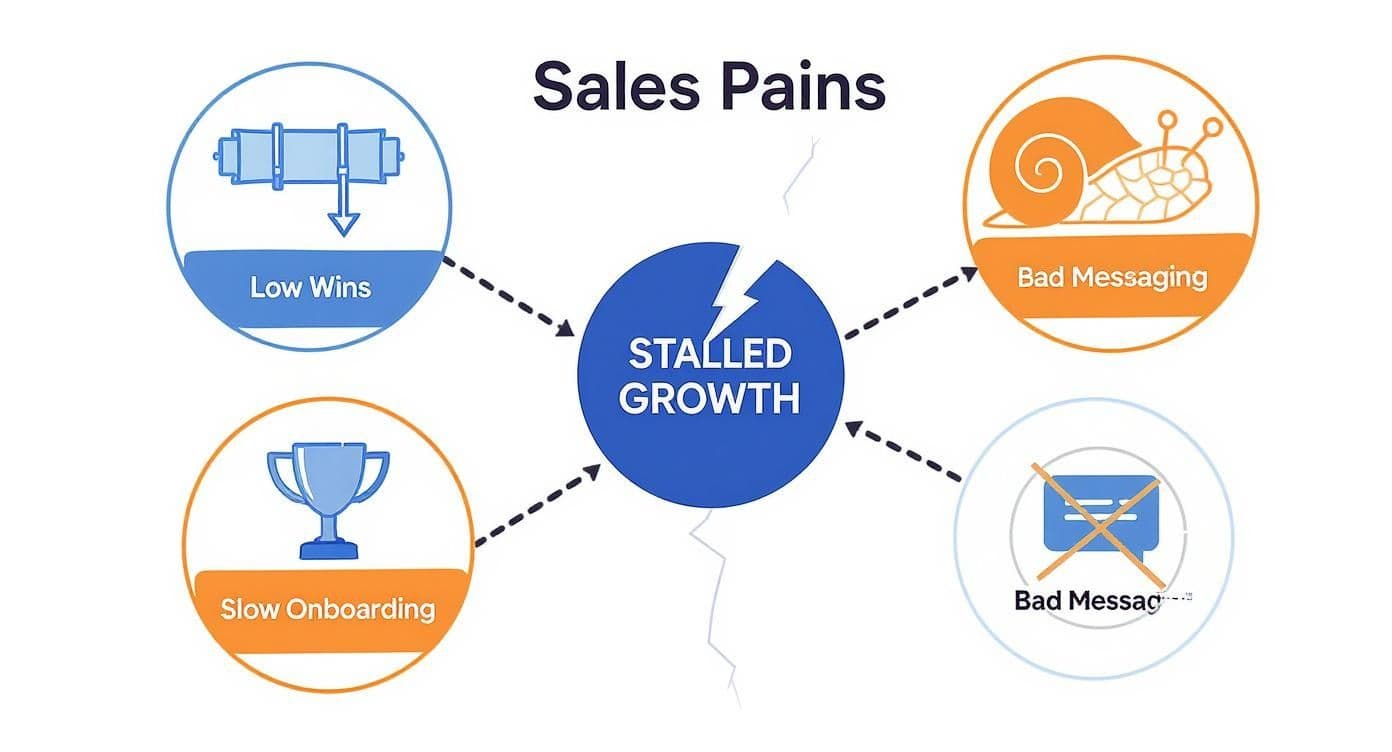
This visual highlights that issues like slow onboarding aren't isolated problems. They are direct contributors to broader organizational challenges like low win rates and stagnant revenue.
Actionable Implementation and Optimization
The final deliverables focus on implementation and optimization, making sure the new frameworks and systems are adopted and produce measurable results. This is where a consultant helps you fine-tune your operations and technology to support the new strategy.
A great consultant doesn’t just hand you a plan; they help you install it. Key deliverables in this phase include:
- Revamped New-Hire Onboarding Program: A structured, repeatable program designed to slash ramp-up time. It ensures every new seller becomes a productive, quota-carrying team member in record time, often cutting onboarding by up to 50%.
- Continuous Coaching Methodology: This moves training from a one-time event to an ongoing process. The consultant implements a framework for managers to provide consistent, data-driven coaching that builds skills and reinforces best practices.
- CRM Optimization Plan: Your CRM should help reps sell, not slow them down. A consultant will audit your current setup and provide a clear plan to optimize workflows, improve data hygiene, and boost user adoption.
These deliverables create a powerful, self-sustaining ecosystem. The playbook standardizes the approach, coaching sharpens skills, and the optimized tech stack removes friction. To see how a well-structured playbook can transform a team, explore these powerful sales playbook examples.
Optimizing Your Sales Technology Stack
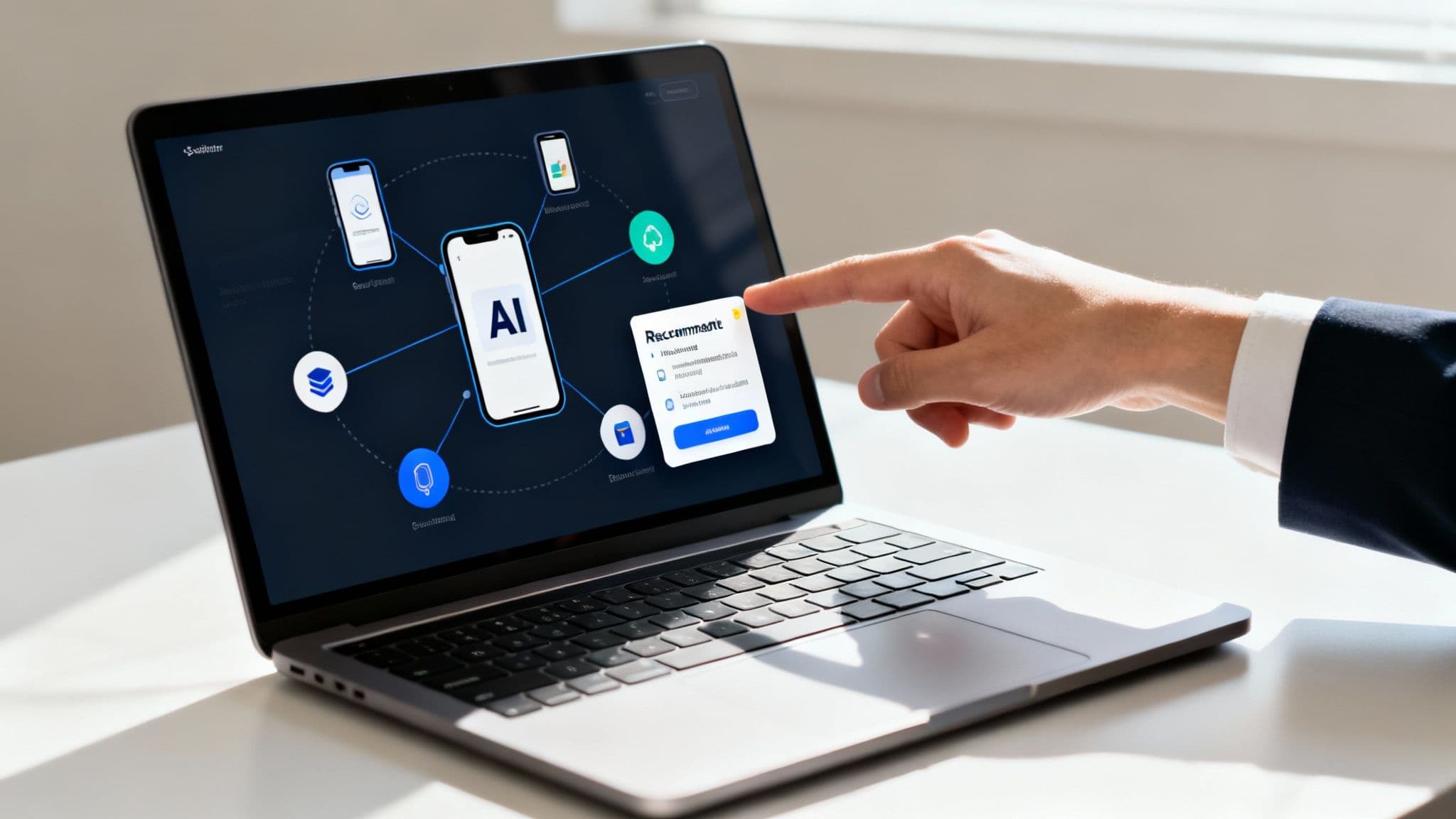
Great strategy and content are crucial, but modern sales enablement runs on technology. The right tools give your team superpowers, while the wrong ones create friction. That's why a huge part of any sales enablement consulting engagement is a deep-dive audit of your sales tech.
The goal isn't to pile on more software. Many teams are drowning in "tool bloat"—a graveyard of disconnected platforms that reps have learned to ignore. A consultant's job is to ensure your tech stack is integrated, gets used, and makes the sales process smoother.
From Tech Chaos to Integrated Power
Does this sound familiar? You have a powerful CRM, a sales engagement platform, and a content library, but none of them talk to each other. Reps waste time toggling between screens, manually logging data, and digging for that one perfect case study. All that inefficiency pulls sellers away from what they should be doing: selling.
A consultant steps in to untangle this web. They map out workflows, spot redundancies, and build a clear plan for integration. The point is to create a seamless ecosystem where tech works in the background, making a seller's job easier, not harder.
Your tech stack should be a force multiplier, not a productivity tax. The aim is to create a single, unified workflow where your CRM, content platform, and engagement tools work together to guide sellers to the next best action.
Driving Adoption and Proving Value
Even the world's best tool is useless if nobody uses it. Low adoption is a massive problem, usually because of poor training or a failure to show reps what's in it for them. A good consultant connects technology directly to results.
For example, instead of just launching a new content management system, they'll show reps how it uses AI to surface the perfect asset for their specific deal stage, saving them time and boosting win rates. By focusing on the "what's in it for me," consultants drive real adoption that sticks.
This is especially true for platforms that make information easy to find. The screenshot above from Highspot, a popular sales enablement platform, shows how a well-organized system serves up relevant content in a clean, intuitive way. This clarity means reps can find what they need in seconds, making them more effective in every conversation.
Integrating Advanced Technologies for a Competitive Edge
A top-tier sales enablement consultant also looks ahead. They help you pinpoint and integrate powerful technologies that give your team a real competitive advantage. To get the most out of your tech, it's critical to identify the best AI tools for sales that can automate tasks and deliver game-changing insights.
This includes tools like:
- AI-Driven Content Recommendations: Systems that automatically suggest the most effective content based on the deal's industry, stage, and buyer persona.
- Intent Data Platforms: Tools that track online research signals to find accounts actively looking for a solution like yours, enabling smarter outreach. You can learn more about choosing the right B2B sales intelligence platform to capture these signals.
The market for these platforms is exploding for a reason. Valued at USD 6.38 billion in 2025, it's projected to hit USD 29.18 billion by 2035. With over 70% of top sales organizations already using these tools, it’s clear they are a core part of any modern revenue strategy.
“Automatic account profile detail I can use to manage my territory. Using Salesmotion AI to generate value statements per persona, account, etc. Using Salesmotion to give me a starting point based on new hires, or news alerts is critical.”
Adam Wainwright
Head of Revenue, Cacheflow
Choosing the Right Consulting Firm
Picking a partner for your sales enablement consulting needs is one of the most important calls you'll make. The right firm feels like a strategic extension of your team, helping you build a foundation for predictable revenue growth. The wrong one can lead to wasted time, frustrated sellers, and a failed initiative that sets you back months.
Finding the right fit means looking past a slick presentation. You need a partner who understands your specific challenges, has a proven track record, and brings a methodology that aligns with your company culture. This isn't just about hiring an expert; it's about forming a partnership built on trust.
Evaluating Core Competencies and Experience
The first thing to vet is relevant expertise. A consultant who’s only worked with massive enterprise software companies probably isn't the right fit for a fast-growing SaaS startup. You need someone who speaks your language and understands the unique pressures of your market.
Look for firms that can point to a clear history of solving problems just like yours. Their industry experience should be obvious in how they talk about your challenges and the solutions they propose. This targeted expertise ensures they won’t be learning on your dime.
The most effective sales enablement consultants don't apply a generic template. They use their specialized experience to diagnose your unique situation and build a custom solution that gets to the root causes of your sales challenges.
This level of specialization is what separates a good consultant from a great one. From the first conversation, they should feel like an insider, asking smart questions that prove they’ve been in your shoes before.
Critical Questions to Ask Potential Partners
Once you've shortlisted a few firms, it's time to dig deeper. The discovery process is a two-way street. While they're qualifying you, you should be rigorously qualifying them. How they answer these questions will tell you everything about their process, transparency, and ability to deliver results.
Here are a few essential questions to guide your evaluation:
- How do you define and measure success for an engagement like this? Their answer should skip vague promises and go straight to concrete metrics like win rates, quota attainment, and sales cycle length. A strong partner will insist on establishing baseline metrics first.
- Can you walk us through a case study of a company with a similar challenge? Ask them to get into the details—the problem, the solution they built, and the specific, measurable outcomes. This is how you see if they can translate theory into practice.
- What does your typical engagement process look like? They should be able to lay out a clear, phased approach, from diagnosis and strategy to implementation and support. You're looking for a structured methodology, not just a random list of deliverables.
- How do you handle change management and drive adoption with the sales team? The best strategy is useless if reps don't buy in. A great consultant will have a clear plan for winning over the team and making sure new behaviors stick.
Their responses will help you gauge their strategic depth and operational rigor. You’re looking for a partner who is just as focused on the "how" as they are on the "what."
Consulting Firm Evaluation Checklist
As you talk to different sales enablement consulting firms, patterns will start to emerge. Knowing what to look for—and which red flags to watch out for—can help you make a confident decision. This checklist provides a simple framework to compare your options.
| Evaluation Criteria | What to Look For | Red Flags to Avoid |
|---|---|---|
| Proven Methodology | A clear, documented process for diagnosing problems and implementing solutions. | A "we'll figure it out" approach or a one-size-fits-all sales pitch. |
| Focus on Outcomes | A clear connection between their work and your key revenue metrics. | A heavy focus on deliverables (e.g., a playbook) without tying it to business impact. |
| Client Case Studies | Detailed, transparent examples with verifiable results and client testimonials. | Vague success stories or an unwillingness to provide specific client references. |
| Cultural Fit | A collaborative, partnership-oriented approach that feels like an extension of your team. | A rigid, prescriptive style that doesn't account for your unique company culture. |
Ultimately, choosing the right firm comes down to finding a partner you trust to guide your team through a significant change. By carefully evaluating their expertise, asking the tough questions, and looking for a genuine cultural fit, you can find a consultant who will help you build a true revenue machine.
Key Takeaways
- Sales enablement consulting firms help organizations build repeatable, scalable sales processes by auditing current workflows, creating playbooks, and optimizing the sales technology stack.
- The right consulting partner delivers strategic assets including onboarding programs, content libraries, coaching frameworks, and tech stack recommendations tailored to your specific sales motion.
- Choosing the right firm requires evaluating their industry expertise, methodology, past results, and cultural fit. Ask for references and case studies from companies similar to yours.
- Measure ROI through a combination of lagging indicators like win rates, sales cycle length, and quota attainment, alongside leading indicators like content utilization, ramp time, and lead conversion rates.
- The best consulting engagements leave your team self-sufficient. Look for partners who build internal capabilities rather than creating long-term dependency on external support.
Measuring the ROI of Your Partnership
Bringing on a sales enablement consulting firm is a serious investment, and every leader asks the same question: "What's the return?" The answer isn’t about waiting six months to see if revenue ticks up. It’s about tracking a clear, data-driven story of value from day one.
The key is to split your metrics into two camps: lagging indicators that show final results and leading indicators that show early progress.
Lagging Indicators: The Bottom-Line Results
Lagging indicators are the traditional, bottom-line metrics that get everyone’s attention. They are the direct result of improved sales effectiveness and offer the clearest proof that the partnership is working.
Think of them as the final score of the game.
Any consultant worth their salt will insist on getting baseline numbers for these before starting. Key lagging indicators include:
- Increased Win Rates: The most direct measure of success. Are you closing a higher percentage of deals in your pipeline?
- Shorter Sales Cycles: How fast are deals moving from the first conversation to a signed contract? A shorter cycle means more efficiency and faster revenue. You can learn more in our guide to pipeline velocity.
- Higher Quota Attainment: What percentage of your sales team is hitting their number? This shows if the new system is lifting the entire team, not just your top performers.
Leading Indicators: Tracking Early Progress
While lagging indicators tell you if you won, leading indicators tell you why you're winning. These are the upstream metrics that track whether your team is adopting the new behaviors and processes. They give you early proof that the consultant's strategy is taking hold, long before the final revenue numbers come in.
Tracking leading indicators gives you confidence that your investment is on the right track. They are the vital signs of a healthy sales transformation, showing that reps are adopting the new habits required for long-term success.
These metrics offer a real-time pulse on the engagement's health. For example, when consultants help integrate AI tools and intent data, it can boost effectiveness and increase close rates by up to 29% compared to purely manual methods. This is the kind of immediate impact sales enablement consulting can have. You can find more insights about the sales enablement market on coherentmarketinsights.com.
Common leading indicators to watch are:
- Improved Content Utilization: Are reps actually using the new playbooks and battle cards?
- Faster New Hire Ramp Time: Are new sellers getting up to speed and hitting quota faster?
- Higher Lead Conversion Rates: Is the team booking more meetings from the leads they’re given?
Ready to stop guessing and start winning? Salesmotion is an AI-powered account intelligence platform that automates the research and insight generation your sales team needs. We help you scale personalized engagement, accelerate "why now" conversations, and turn account signals into measurable pipeline growth. Learn how Salesmotion can transform your sales strategy.
Frequently Asked Questions
What does sales enablement consulting typically cost?
Costs vary by project scope, team size, and engagement length. A specific one-off project like building a custom sales playbook typically runs $15,000 to $30,000. Comprehensive ongoing engagements covering continuous coaching and process optimization usually work on monthly retainers ranging from $10,000 to over $25,000. The best firms tie their pricing directly to measurable business results.
Is my company too small for sales enablement consulting?
Not at all. While large enterprises have used these services for years, consulting is incredibly valuable for high-growth startups and mid-market companies. Getting foundational processes right early can prevent expensive mistakes during scaling. The key is finding a firm with experience at your company's stage that understands the unique challenges of building or growing a sales team.
How long does it take to see results from a consulting engagement?
Leading indicators like more consistent messaging and increased content utilization often appear within the first 90 days. Bigger bottom-line results such as higher win rates, shorter sales cycles, and improved quota attainment typically take 6 to 12 months to fully materialize as new habits take hold and existing pipeline deals close under the improved methodology.
What are the key deliverables from a sales enablement consulting engagement?
Core deliverables include a custom sales playbook detailing methodology and messaging, data-driven buyer personas, competitive battle cards, a revamped new-hire onboarding program that can cut ramp time by up to 50%, a continuous coaching framework for managers, and a CRM optimization plan. Together these assets create a self-sustaining system that drives consistent performance.
How do I choose the right sales enablement consulting firm?
Evaluate firms on four criteria: a proven methodology with documented processes, a focus on business outcomes tied to revenue metrics, detailed client case studies with verifiable results, and cultural fit that feels like an extension of your team. Ask potential partners how they define and measure success, request relevant case studies, and specifically ask about their approach to change management and adoption.
What is the ROI of sales enablement consulting?
Companies working with enablement consultants report ROI as high as 383%, driven by concrete improvements in win rates, sales cycle length, and quota attainment. Organizations with a dedicated enablement strategy see a 49% higher win rate on forecasted deals. Track both lagging indicators like revenue metrics and leading indicators like content utilization, ramp time, and lead conversion rates to measure the full impact.

